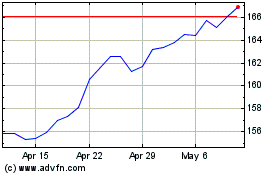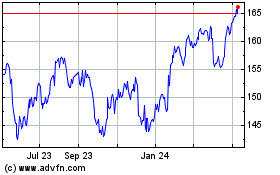Backlash to U.S.-style management offers a lesson in balancing
German values, profit
By Ellen Emmerentze Jervell
FRANKFURT -- Germany's Henkel AG, a manufacturer of industrial
and household staples including detergent and glue, produces
financial results anything but humdrum. Over the past eight years,
its share price has more than tripled and net earnings have risen
almost 60%.
Driving this surge, which surpassed that of rivals Procter &
Gamble Co. and Unilever PLC, was Danish ex-Chief Executive Kasper
Rorsted, who gave once-sleepy Henkel a jolt of American-style
intensity and profit focus that he learned working at Compaq
Computer Corp., the aggressive PC pioneer. In eight years as CEO he
also expanded Henkel's U.S. footprint with acquisitions and by
introducing its Persil laundry soap to America.
Some longstanding employees said they were unhappy with how
Henkel's performance and Americanization affected the company
culture and felt it gutted what they saw as a fostering
environment. Many said they felt demoralized.
Mr. Rorsted is set to become the new chief executive of
sportswear firm Adidas AG in October. Henkel's shares slumped when
he announced his departure.
Now Henkel's new CEO, Belgium-born company veteran Hans Van
Bylen, who took over in May and then last month signed a $3.6
billion deal to buy Sun Products Corp. of Wilton, Conn., faces the
challenge of maintaining Mr. Rorsted's streak without pushing staff
too hard.
"I took over a very successful company," he said, adding that
success requires "highly engaged and motivated employees."
Henkel's makeover typifies forces at play across Europe's
largest economy. German corporate culture, with layers of worker
protection, has largely resisted globalization but now is
succumbing. Culture clashes are "almost everywhere," said Oliver
Hecker, district manager at German industrial union IG BCE.
"I would call it figures-focused American meets value-focused
German," he said -- referring to a focus on employees and the
community as much as shareholders. "In the long term, the question
is, what this will do to the German economy?"
Former and current staff of Henkel spoke proudly of working for
what many say had been a "typical German company." It offered
predictable work hours, extensive training and champagne at
Christmas parties.
"I guess it was somewhat leisurely," said Winfried Zander, head
of Henkel's workers' council and a 40-year company veteran.
Henkel, founded in 1876, was "a comfortable place to work," said
Harvard Business School Professor Robert Simons, who has studied
the firm. "Most employees didn't see any reason to change."
Mr. Rorsted did. Large companies lumber because "they can afford
to be slow," he said last fall. "Sometimes you need to remove
resources to get the job done."
The first outsider and non-German to run Henkel, Mr. Rorsted
became CEO in 2008 and soon set aggressive financial targets that
one analyst labeled "wishful thinking."
To slash costs and hit targets, Mr. Rorsted moved German
administrative jobs to lower-cost countries, closed plants, and
shed 800 of Henkel's 1,000 brands. Between 2008 and 2015, the
workforce fell roughly 10%, to 49,450 employees.
"When things began to change as fast as they did, it was quite
the shock for many," said Mr. Zander.
Almost as unsettling to staff, Mr. Rorsted changed Henkel's
official language to English and stopped attending the annual
workers' council meeting, a break with tradition that irked many
employees.
"The workforce certainly did not see that as a positive signal,"
said Mr. Zander. "We tried to say that this is important in Germany
but he had a different perspective."
Others applauded the change.
"He clearly influenced and changed the Henkel culture," said
Tina Müller, a former Henkel marketing manager. "He made it more
professional."
He also changed the company's motto from 'A Brand Like a
Friend,' to 'Excellence is our Passion,' because "you want to win,"
Mr. Rorsted said. "And being friendly is not winning."
Posters went up saying "Breaks Are Boring," and "Thank God, It's
Monday." In 2008 he scrapped the Christmas party to cut costs.
Unable to push large-scale American-style layoffs under German
labor law, Henkel offered early retirement and buyouts. Staff who
left were often not replaced, said employees. Some who remained
said they felt pressed to shift from highly structured
collective-agreement contracts that defined work hours and
responsibilities to more open contracts with less defined roles,
presented as promotions with higher pay.
A Henkel spokesman denied that employees were pressed to shift
contracts. "Some positions are not being replaced while we add new
positions in other areas of our businesses," he said of staffing.
"Surely, none of our employees was pressured to accept such a
promotion."
Increased workloads and demands for speed forced many staff to
work more hours than previously, workers said. Some complained of
depression or burnout. Several people who took buyouts said they
felt pressured to leave.
A current employee said human resources had begun referring to
"head counts" rather than "people." "We're all scared of suddenly
being insignificant and losing our jobs," he added.
The company spokesman said Henkel follows all labor rules and
offers a range of working options but "the speed of change and
innovation has increased for all companies globally" over recent
years.
Mr. Van Bylen, the new CEO, said he hoped not to be judged in
comparison to Mr. Rorsted. "We have to do the right things to
capture future opportunities for our businesses," he said.
Mr. Van Bylen plans to attend the annual workers' council
meeting, the company said.
Write to Ellen Emmerentze Jervell at ellen.jervell@wsj.com
(END) Dow Jones Newswires
July 28, 2016 02:48 ET (06:48 GMT)
Copyright (c) 2016 Dow Jones & Company, Inc.
Procter and Gamble (NYSE:PG)
Historical Stock Chart
From Mar 2024 to Apr 2024

Procter and Gamble (NYSE:PG)
Historical Stock Chart
From Apr 2023 to Apr 2024
